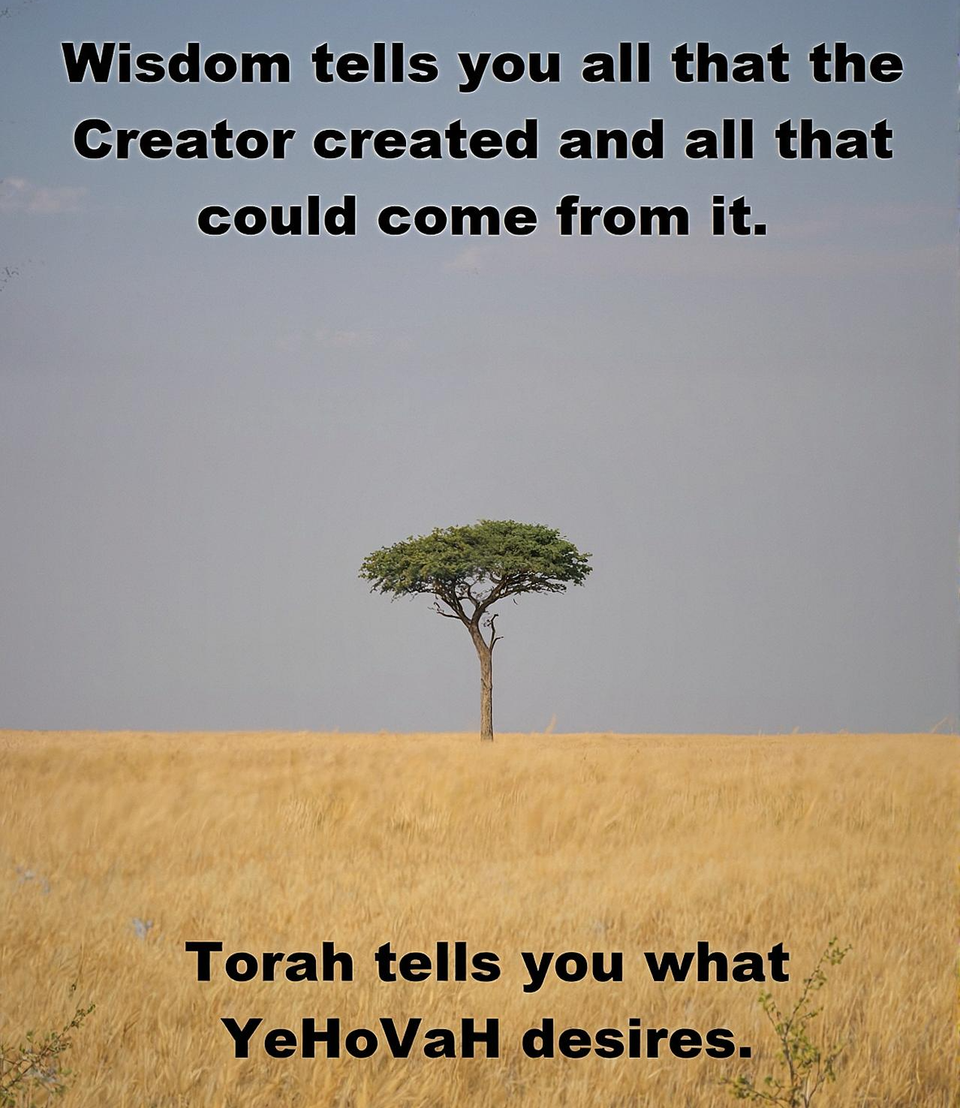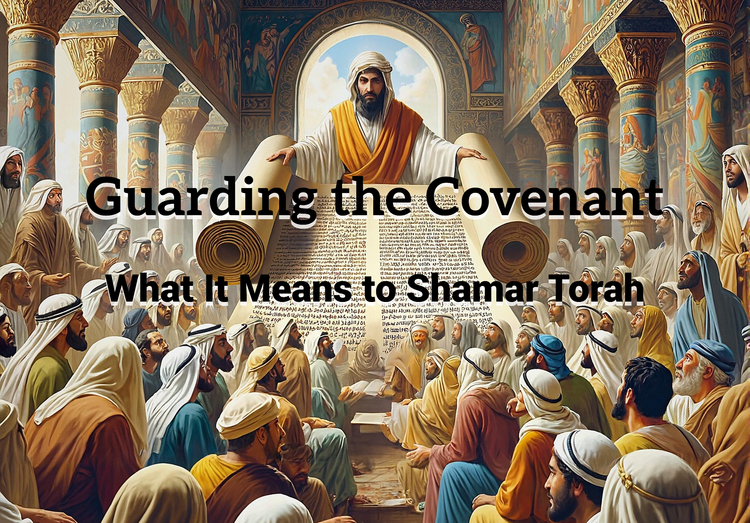Torah Versus Wisdom

“If they tell you there is wisdom among other peoples, believe them.
If they tell you there is Torah among other peoples, do not believe them.”
— Midrash Rabbah, Eikhah 2:13
The Distinction Between Wisdom and Torah
Torah is distinct from what we usually call wisdom. Even calling it “divine wisdom” is not sufficient, since all that exists is shaped by divine wisdom. Yet Torah stands above wisdom, transcending it.
Our bodies, our environment, and our very consciousness are indeed wondrous, crafted with wisdom, as the Psalmist declares:
“How many are Your works, Y’hovah! In wisdom You have made them all; the earth is full of Your creatures.”
— Tehillim (Psalms) 104:24, CJB
The Torah itself begins with creation, and the ancient Targum Yerushalmi renders the opening verse, “In the beginning Elohim created …” as “With wisdom did Elohim create.” This suggests that wisdom was the instrument, but Torah was the source.
The sages of the Talmud elaborate:
“When a mortal king builds himself a palace, he does not do so by his own wisdom, but according to the advice of an architect. The architect, too, relies on his sketches and plans to construct the rooms and doorways. Likewise, the Holy One, blessed be He, looked into the Torah and created the world.”
— Bereshith Rabbah 1:1
Thus, wisdom was employed in creation, but Torah was the blueprint.
Wisdom Describes What Is — Torah Prescribes What Should Be
Here lies the essence of the difference:
- Wisdom describes how the world works and reveals patterns of cause and effect.
- Torah prescribes what the Creator desires—His will expressed through command and covenant.
Wisdom may reveal that kind acts often bring kindness in return, or that stealing has harmful outcomes. Yet wisdom leaves the decision to the individual—it describes the natural order.
Torah, however, declares with divine authority:
“Do not steal.”
— Shemot (Exodus) 20:15, TS2009
This command is not offered for its practical benefit, but because it is the revealed will of Y’hovah. Torah does not depend upon human logic or moral reasoning—it is obedience to divine order, not the result of understanding it.
Therefore, Torah does not merely inform; it transforms. It is not wisdom that leads to good conduct, but divine instruction that forms the soul into the image of the Creator’s righteousness.
Torah: The Revelation of the Creator’s Heart
Wisdom says, “This is how the world functions.”
Torah says, “This is how you shall live before Y’hovah.”
As Mosheh taught Yisra’el:
“See, I have taught you laws and right-rulings, as Y’hovah my Elohim commanded me, to do thus in the land which you go in to possess.”
— Devarim (Deuteronomy) 4:5, TS2009
This shows that Torah is not simply a moral guide or a code of conduct—it is the revelation of Y’hovah’s will to His people. It is the means of covenantal relationship, showing how humanity may dwell in harmony with the Creator’s presence.
When wisdom seeks to understand, Torah calls us to obey. When wisdom reasons, Torah commands. It is not merely truth that can be discovered; it is truth that must be received.
Y’hoshua: The Living Torah
In the fullness of time, Y’hovah revealed His Torah not only in written form but in living form—through His Son, Y’hoshua HaMashiach.
“In the beginning was the Word, and the Word was with Elohim, and the Word was Elohim. … And the Word became flesh and dwelt among us.”
— Yochanan (John) 1:1, 14, CJB
Y’hoshua is not merely wise—He is the wisdom and Torah of Y’hovah embodied. As it is written:
“But to those who are called, both Yehudim and Greeks, Messiah is the power of Elohim and the wisdom of Elohim.”
— 1 Corinthians 1:24, TS2009
Y’hoshua is Torah made flesh—the divine blueprint of righteousness, mercy, and truth revealed in human form. Where wisdom guides men to seek truth, Torah in Y’hoshua draws us into a relationship with Truth Himself.
He did not come to replace the Torah but to embody and fulfill it. As He declared:
“Do not think that I came to destroy the Torah or the Prophets. I did not come to destroy but to complete.”
— Mattityahu (Matthew) 5:17, TS2009
In Y’hoshua, the distinction between Torah and wisdom becomes the meeting point between heaven and earth—the place where divine revelation becomes living reality.
Walking in the Way of Torah
To walk in wisdom is good; to walk in Torah is obedience. One can study wisdom and yet remain distant from Y’hovah. But to study Torah and live by it is to draw near to His presence.
As it is written:
“For the command is a lamp, and the Torah a light, and reproofs of discipline a way of life.”
— Mishlei (Proverbs) 6:23, TS2009
Wisdom shows the way of light, but Torah is the light. Y’hoshua, the Living Torah, said, “I am the light of the world” (Yochanan [John] 8:12, CJB). Thus, those who follow Him walk not only in understanding but in obedience to divine truth.
When a man follows Y’hoshua in Torah, he walks in the pattern of Y’hovah’s own will. That is not wisdom alone—it is covenantal transformation.
Wisdom reveals what is good; Torah reveals the One who is good.
Wisdom may show us the Creator’s handiwork; Torah reveals His heart.
True wisdom begins in awe of Y’hovah, but Torah carries us beyond awe into relationship and obedience. Through Torah we learn not only how to think rightly, but how to live rightly before our Creator—and through Y’hoshua HaMashiach, the Living Torah, we are empowered to walk in that light.
“Torah is not mere knowledge; it is the living breath of Y’hovah calling His people to holiness.”
By Rabbi Francisco Arbas
📧 franciscoarbas.yisrael@gmail.com
Following His ‘WAY’ — Netzari Mashiach Judaism



Comments ()